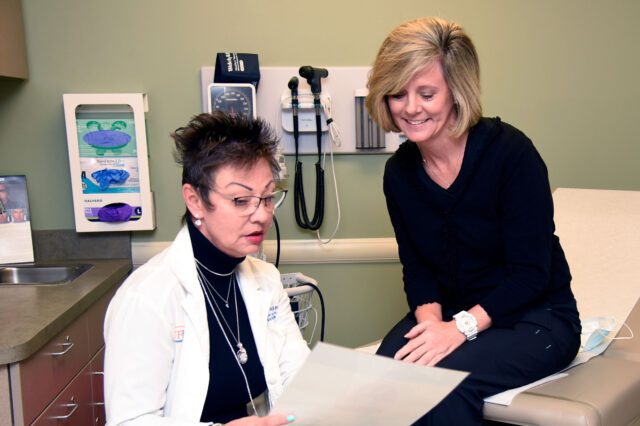Urinary incontinence in women

Urinary incontinence is a loss of bladder control that results in urine leakage. This leakage is often uncontrollable and can negatively impact your life. It is a common and curable condition and does not have to be a normal part of aging.
Our specialists with UF Health in Jacksonville can offer you many treatment options to ease your symptoms and help you regain bladder control. If you have urinary incontinence, make an appointment with a UF Health specialist in Urogynecology and Reconstructive Pelvic Surgery to discuss treatment options.
Urinary incontinence: Types
There are several types of urinary incontinence:
- Stress urinary incontinence: This is the most common type of urinary incontinence, defined as leakage of urine that occurs with coughing, sneezing, changing positions, jumping or any other body movements that cause increased pressure on the bladder.
- Urge urinary incontinence: With this type of incontinence, patients may have urine loss associated with a sudden urge to void that cannot be deferred.
- Overactive bladder: This condition is associated with difficulty holding or storing urine, and patients can experience urinary urgency, urinary frequency and urinary leakage with a sudden urge to void.
- Mixed urinary incontinence: Particularly after childbirth and as you age, you may combination of stress urinary incontinence and urgency urinary incontinence.
Urinary incontinence: Diagnosis
The first step is to see a specialist. During your visit:
- Your provider will take a detailed history of your urinary symptoms
- You will have a thorough physical exam to assess your bladder, and your medical provider may test your urine for infection and assess how much urine is left in your bladder after urinating.
- Additional testing may be needed to gain a better understanding if deemed appropriate by your provider. These may include blood testing, ultrasound of your kidneys or a complex procedure to check how your bladder functions (urodynamic study).
Urinary incontinence: Treatments
Our specialists will create a personalized treatment plan for your needs. There are multiple treatments available for urinary incontinence:
Nonsurgical procedures:
- Lifestyle modifications: Changing fluid intake and understanding urination patterns can help with bladder control.
- Botox injections: A specialist can inject Botox into the bladder to treat urge incontinence or overactive bladder to help the muscles relax and allow more time to get to the bathroom when feeling the need to urinate.
- Medications: A number of medications can help decrease bladder spasms, tighten the urinary sphincter and alleviate irritation to help with incontinence.
- Nonsurgical device: A pessary is a silicone device inserted into the vagina, and designed to support the urethra and improve urinary leakage.
- Pelvic floor physical therapy: Exercises, such as Kegels, can strengthen your pelvic floor giving you better control over your bladder.
- PTNS (Percutaneous Tibial Nerve Stimulation): A nonsurgical procedure using a very thin needle placed just above the ankle with stimulation that works to block signals that are causing the bladder to be overactive
- Urethral bulking: A bulking agent such as silicon is injected into the wall of the urethra, to add bulk and strengthen the sides of the urethra allowing it to seal more tightly to prevent leakage.
Surgical procedures:
- Midurethral sling procedures: a minimally invasive procedure to insert a sling around the urethra to help support it, which has shown a high cure rate for stress urinary incontinence and a quick recovery time.
- SNM or Sacral Neuromodulation: An implanted device that provides gentle stimulation to the sacral nerve just above the tail bone to help control the bladder.
